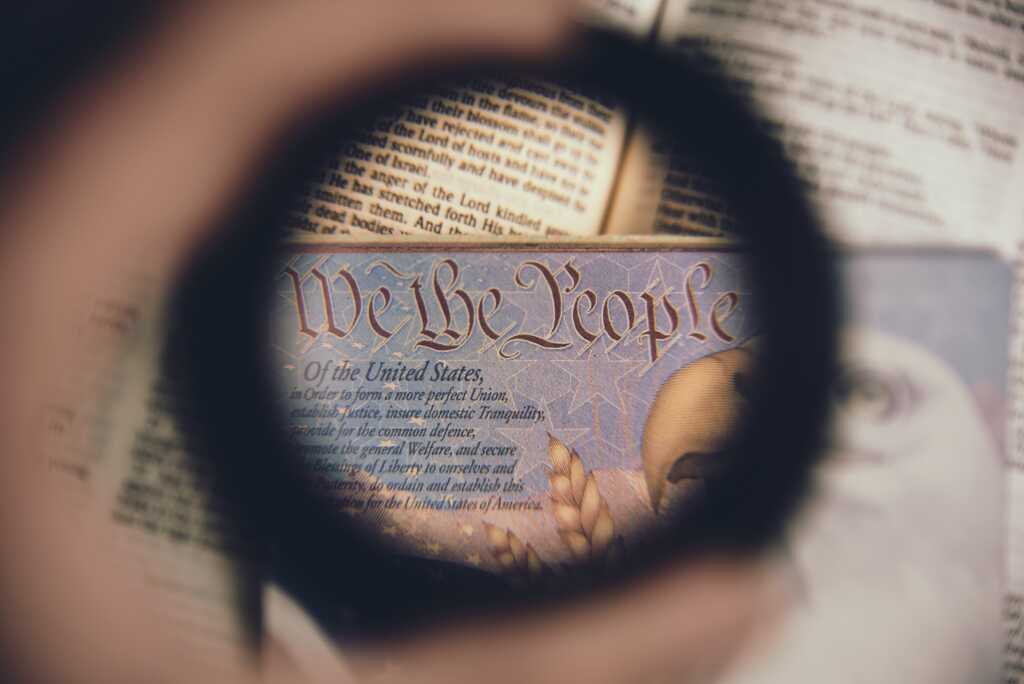A new report offers a snapshot of Americans’ attitudes on religious freedom and the First Amendment, providing a fascinating lens into how citizens view the intersection of religion and culture.
Listen to the latest episode of CBN’s Quick Start podcast 👇
The 2022 Religious Freedom Index, an annual survey from The Becket Fund for Religious Liberty, a religious liberty law firm, found areas of concern and encouragement.
Among the findings, Americans showed sweeping support for Christian business owners acting on conviction. The data is especially relevant considering 303 Creative LLC v. Elenis, a U.S. Supreme Court case surrounding Lori Smith, a graphic designer and the owner of 303 Creative, LLC.
Smith has been locked in a battle with the state of Colorado over a law she believes requires her to “violate her core beliefs” by compelling her to create same-sex wedding websites.
Derringer Dick, a strategic research associate at The Becket Fund for Religious Liberty, told CBN’s Faithwire The Religious Freedom Index sheds light on Americans’ views on the matter:
“We actually ask a question on a similar hypothetical scenario where you’ve got a website designer who’s asked to design a website for a same-sex wedding, and she has to decline because of her faith,” Dick said. “And we asked Americans if they thought that should be allowed or not.”
Dick said the survey found around 70% of Americans support the website designer. He said he was pleased to see how people responded to “tough” and pointed questions like this on complex and multifaceted matters.
However, there were some areas of concern regarding Americans’ beliefs about religion as a problem or a solution.
“One of the things that we found [that gives] us cause for pause … we asked Americans to what degree they think religion is part of the solution or part of the problem in the issues that our nation faces today,” Dick said. “And this year only 50% — so half of Americans — thought that religion was part of the solution to the issues our country is facing.”
This proportion dropped substantially from the over 60% found in last year’s survey, an unexpected development.
“Last year, 61% answered that religion was part of the solution, 64% said the same for people of faith, and 58% said the same for people of faith and religion,” the report reads. “This year, those respective numbers dropped to 50% (an 11% decrease), 55% (a 9% decrease), and 50% (an 8% decrease).”
Plus, around 50% of Americans felt they had a complete understanding of the things religion has done for society.
“I see there is a real opportunity for education,” Dick said of those numbers. “To … fill people in, bring them up to speed on the good things that religion does, not just for the individuals but also for society as a whole. I think there’s a real opportunity there.”
There was also another metric worthy of sparking some concern. Just 47% of Americans were able to place religious freedom as a First Amendment protection.
“Eighty-five percent of Americans correctly placed free speech in the First Amendment,” Dick said. “Less than half of Americans could correctly place free exercise of religion there.”
Interestingly, these statistics didn’t improve much with education, as just 51% of Americans with post-graduate degrees could pinpoint the free exercise of religion as a First Amendment right.
“Whatever is going on that’s kind of causing that gap there — education doesn’t really seem to be helping it very much,” he said.
Another intriguing takeaway in the annual survey was “support for Native Americans,” something Dick said is often glossed over in American culture.
“We ask a question about preserving Native American sacred sites because Native Americans often worship in the outdoors,” he said. “They don’t necessarily go to a church or a temple, and so a lot of the sacred sites that they’ve worshipped at for generations from time immemorial are now on federal land, and they’re not necessarily always well-protected.”
Americans, though, overwhelmingly want to see these sites protected, with nearly 90% of respondents indicating this was the case.
In addition to helping spawn more education on these issues, Dick said he’s also hoping The Religious Freedom Index also aids in revealing the powerful role of religion in society.
“[We hope people will] see a real opportunity in their communities to help them better understand the role of religion in civic life and the blessings it can be to the community,” he said. “It’s a good opportunity to have a nuanced understanding of what Americans believe about religion and the First Amendment.”
***As the number of voices facing big-tech censorship continues to grow, please sign up for Faithwire’s daily newsletter and download the CBN News app, developed by our parent company, to stay up-to-date with the latest news from a distinctly Christian perspective.***



